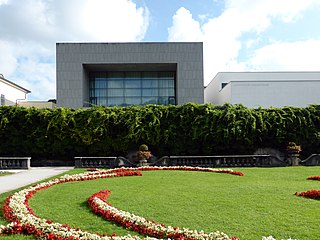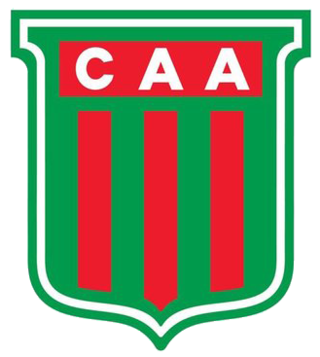Related Research Articles

The "Argentine National Anthem" was adopted as the sole official song of Argentina on 11 May 1813—three years after the May Revolution. Its lyrics were written by the Buenos Aires-born politician Vicente López y Planes and the music was composed by the Spanish musician Blas Parera.

.ar is the Internet country code top-level domain (ccTLD) for Argentina. It is administered by NIC Argentina. Registering an .ar domain directly is allowed as of 2020. Previously, only 9 of the second-level domains listed below were open for registration, and a local presence in Argentina was required. As of August 2024, some new augmented reality companies are using domains directly under the .ar TLD.

Asociación Atlética Argentinos Juniors is an Argentine sports club based in La Paternal, Buenos Aires. The club is mostly known for its football team, which currently plays in the Argentine Primera División, and was recognized as one of the most important football teams of South America by FIFA. It is one of the eight Argentine first division teams that have won the Copa Libertadores. The continental trophy was won in the club's first entry to the contest, in 1985.

The Chacarera is a dance and music that originated in Santiago del Estero, Argentina. It is a genre of folk music that, for many Argentines, serves as a rural counterpart to the cosmopolitan imagery of the Tango. A dance form played by contemporary musicians as soloists or in small ensembles of voice, guitar, violin and bombo drum, the Chacarera is often legitimized by its “origin” in the remote province of Santiago del Estero.

Mozarteum University Salzburg is one of three affiliated but separate entities under the "Mozarteum" moniker in Salzburg municipality; the International Mozarteum Foundation and the Mozarteum Orchestra Salzburg are the other two. It specializes in music, the dramatic arts, and to a lesser degree graphic arts. Like its affiliates it was established in honour of Salzburg-born musician Wolfgang Amadeus Mozart.
Esteban Benzecry is an Argentine classical composer.

The Campo Argentino del Polo, popularly known as The Cathedral of Polo, is a multi-purpose stadium in Buenos Aires, Argentina. It is currently used mostly for polo, pato and field hockey matches.
The Argentina Open or Abierto Argentino is an annual tennis event for male tennis players held in Buenos Aires, Argentina. The tournament was established in 1927 as the Argentina International Championships and was a combined men's and women's event from 1928 until 1987 when the women's tournament was discontinued. The men's tournament is an ATP Tour 250 event on the ATP Tour, and is played on outdoor clay courts at the 5,500 capacity Buenos Aires Lawn Tennis Club, in the Palermo barrio (neighbourhood). Usually held in February, it includes both a men's singles and a men's doubles tournament. Between 1970 and 1989 it was part of the Grand Prix tennis circuit and a Grand Prix Super Series event (1970–71).
The Scouting and Guiding movement in Argentina consists of at least ten independent organizations as well as some international units. Scouting was officially founded in Argentina in 1912, shortly after the publication of "Scouting For Boys" in Spanish, was granted a National Charter in 1917, and was among the charter members of the World Organization of the Scout Movement in 1922.

Horacio Lavandera is an Argentine pianist, currently residing in Madrid, Spain. As its youngest competitor at the age of sixteen, he won the International Piano Competition Umberto Micheli, held at the Giuseppe Verdi Conservatoire and in Teatro alla Scala in Milan. He has been invited to perform as a soloist with prestigious orchestras, as well as to offer recitals in America, Europe, and Asia.

The National Autonomist Party was the ruling political party of Argentina from 1874 to 1916.

The Bernardino Rivadavia Natural Sciences Argentine Museum is a public museum located in the Caballito neighborhood of Buenos Aires, Argentina.

Roberto Rocca was a prominent Italian-born naturalized Argentinian businessman.

Eduardo Delgado is an Argentine classical pianist and teacher living in California. Born in Rosario, Argentina, Delgado is a recipient of the Vladimir Horowitz Award and has received grants from the Mozarteum Argentino, Martha Baird Rockefeller, and the Concert Artists Guild. In 1999, he was awarded by UNESCO in Buenos Aires. Delgado has given recitals all over the world, in Europe, Asia, South America and North America.
Mario Parmisano, is an Argentinian jazz pianist. He is recognized on the international scene for his work with guitarist Al Di Meola and for his Tango Jazz Trio, performing a unique interpretation about the Music of the Great Tango Master Astor Piazzolla.
Miguel Ángel Gilardi is an Argentine orchestra conductor. He has conducted throughout the world, recorded many concerts and received several awards, including the 2010 Premio Bicentenario.
The 1923 Argentine Primera División was the 32nd season of top-flight football in Argentina. The AFA season began on March 11 and ended on April 27, 1924.

Club Agropecuario Argentino is an Argentine football club sited in Carlos Casares, a city of Buenos Aires Province. Founded in 2011, the club is one of the youngest institutions affiliated to the Argentine Football Association.

The Sociedad Sportiva Argentina was an Argentine multi-sports club sited in Buenos Aires. The headquarters were located in Florida street nº 183 while the stadium was sited in Palermo, next to Hipódromo Argentino. Originally established in 1899 under the name "Sociedad Hípica Argentina" for the practise of equestrian activities, the Sociedad Sportiva would held a large variety of sport events in several disciplines, such as football, athletics, auto racing, aviation, aerostatics, aeronautics, boxing, bicycle racing, motorcycle racing, polo, rugby union, trot, sulky races, show jumping, among others.

Tango Argentino is a musical stage production about the history and many varieties of Argentine tango. It was created and directed by Hector Orezzoli and Claudio Segovia, and premiered at the Festival d'Automne in Paris in 1983 and on Broadway in New York in 1985. The Mel Howard production became a world-wide success with numerous tours culminating with a Broadway revival in 1999–2000. It set off a world-wide resurgence of tango, both as a social dance and as a musical genre. Tango Argentino recreates on stage the history of tango from its beginnings in 19th-century Buenos Aires through the tango's golden age of the 1940s and 50s up to Piazzolla's tangos. Most of the dancers in the show did their own choreography.
References
- ↑ Inter-American music bulletin, Issues 39-74. Pan American Union. 1964. p. 9. Retrieved May 27, 2010.